|
Reading‚ Writing and Reading
The crime writing awards season rumbles on – in fact there seems to be a book award every week these days – but more unusually‚ the crime writing festivals are continuing into November this year.
The main event in southern England these days is undoubtedly the Reading Festival of Crime Writing‚ now in its fifth year‚ which takes place between the 10th and the 13th November rather than in September as in previous years.
.jpg)
The Reading Festival is notable for many reasons not the least of which is the fact that it covers not only crime fiction‚ but true crime writing‚ criminology and social history (or should that be ‘anti-social history’?) with a wide range of expert speakers in all these fields. Full details of this year’s programme can be found at http://www.readingfestivalofcrimewriting.org.uk/programme.html but I have already cherry-picked some events to bring to your attention.
Two of the biggest stars of modern crime fiction‚ Minette Walters and Martina Cole‚ will be there; Professor Barry Forshaw will chair a panel discussion on Victorian crime featuring Anne Perry and Kate (‘Mr Whicher’) Summerscale; historian Alison Weir will discuss the famous ‘Princes in the Tower’ case; David Hewson will talk about the television adaptation of his Rome-based Nic Costa series; and there are some interesting double acts on offer: Michael Dobbs and Quintin Jardine, Adrian Magson and David Headley and, fascinatingly, Natasha Cooper and former armed bank-robber Noel Razor Smith. Something, you might say, for everyone.
Sadly, even I cannot be in two places at once and so will have to miss this year’s Lavenham Literary Festival in the beautiful heart of Suffolk, where one of the many attractions will be a creative writing seminar run by my old chum Caroline Graham. In fact I used the news to pay a social call on Caroline, now a fit and feisty 80, so that we could reminisce about our time as members of the East Anglian chapter of the Crime Writers Association almost twenty years ago.
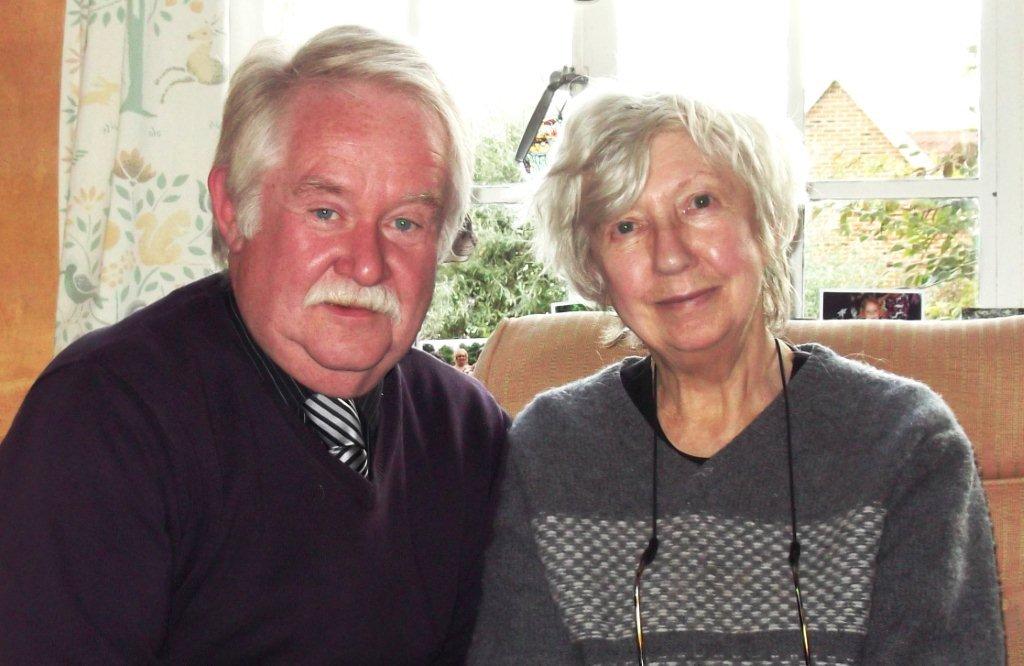
It is just possible that we are the last two surviving members of the East Anglian chapter from when it was chaired by the late Alan Hunter and regular attendees were the late Nancy Livingstone and the late Matthew Coady, the respected crime critic for The Guardian.
Caroline is, of course, best known for her 1987 novel The Killing at Badger’s Drift which introduced Inspector Barnaby and Sergeant Troy, launching them on their hugely popular career in the long-running TV series Midsomer Murders. She maintains however‚ albeit with a twinkle in her eye‚ that her favourite book is her children’s classic BMX Star Rider from 1985 and that her happiest writing memories probably came when doing scripts for Crossroads.
Fool to Myself
Sometimes I seem to make work for myself, and by ‘work’ I mean increasing the pile of books I have to read, or in this case, re-read. In last month’s column I mentioned – en passant – that I remembered enjoying the adventures of British private eye Rex Carver as created by the late Victor Canning in the 1960s when I was “nobbut a lad in short trousers”.
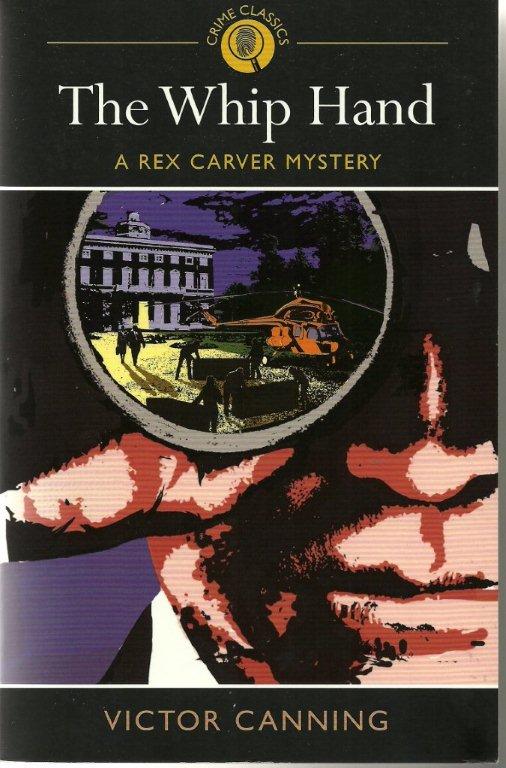 Lo and possibly behold, the day that column went “live” (or whatever the jargon is), I discovered in a local shop a copy of perhaps Rex Carver’s most famous adventure, The Whip Hand, originally published in 1965. Yet this was no tatty second-hand copy, this was a brand new, very attractively published edition (priced at a reasonable £6.99) from Arcturus Publishing in their newly launched Crime Classics series, of which I was totally unaware until now. I have no doubt this is the genuine article, for the text bears a (c) line for Charles Collingwood, who is the literary executor of the Victor Canning estate, although better known to most people as Brian Aldridge, the resident Evil Genius of Ambridge in The Archers. Lo and possibly behold, the day that column went “live” (or whatever the jargon is), I discovered in a local shop a copy of perhaps Rex Carver’s most famous adventure, The Whip Hand, originally published in 1965. Yet this was no tatty second-hand copy, this was a brand new, very attractively published edition (priced at a reasonable £6.99) from Arcturus Publishing in their newly launched Crime Classics series, of which I was totally unaware until now. I have no doubt this is the genuine article, for the text bears a (c) line for Charles Collingwood, who is the literary executor of the Victor Canning estate, although better known to most people as Brian Aldridge, the resident Evil Genius of Ambridge in The Archers.
If that were not coincidence enough, I also mentioned Margery Allingham and her Albert Campion mystery Death of a Ghost last month. Lo – and again behold – Arcturus have also just published an anthology of Allingham/Campion stories under the title My Friend Mr Campion, which is a not a title I recognise from the extensive Allingham section of the library here in Ripster Hall. I suspect it might be a reissue of the 1939 collection Mr Campion and Others, though I will defer to the experts in the Margery Allingham Society.
I was, however, prompted to research Arcturus Publishing (named after the Roman name for a particular bright star, as any fule do kno) and discovered that their first tranche of ‘Crime Classics’ also included: Before the Fact by Francis Iles (almost as outrageous in concept as his classic Malice Aforethought); The Tyler Mystery by Francis Durbridge (a Paul Temple story from 1957); the brilliant Death Walks in Eastrepps by Frances Breeding (the pen-name of John Palmer and Hilary St George Saunders) from 1931; and from 1948 Blueprint for Murder by Roger Bax (the pen-name of Andrew Garve, which was in turn the pen- name of Paul Winterton).
I also discover that Arcturus have also produced new editions of The Adventures of Sherlock Holmes, The Thirty-Nine Steps, The Woman in White and The Moonstone. And, which I think is the most exciting thing of all, they have plans, next year, to re-issue Anthony Berkeley’s 1937 classic Trial and Error, which is one of my favourite mysteries from the so-called “Golden Age”. And if you didn’t know that Anthony Berkeley was also the Francis Iles of Malice Aforethought fame, and you have never heard of Trial and Error, then I’m sorry for you.
Victoriana
I should have mentioned before now that in his excellent “official” Sherlock Holmes novel The House of Silk, published by Orion, author Anthony Horowitz generously and elegantly acknowledges the help of Lee Jackson in his researches and in particular Lee’s excellent website www.victorianlondon.org.
Apart from being an expert in Victoriana, Lee Jackson is also well-known (to the more discerning among us) as the author of some splendid historical mysteries, bounding on to the crime fiction scene in 2003 with London Dust and with a memorable but short-lived series (writing as L. M. Jackson) featuring female detective Sarah Tanner which included The Mesmerist’s Apprentice in 2008.
And speaking of things criminal and Victorian, it would be remiss of me not to mention a new and quite outstanding anthology from Bloomsbury. The Dead Witness, edited by American Michael Sims, is described as “A Connoisseur’s Collection of Victorian Detective Stories” and for once the publisher’s hyperbole is difficult to argue with. 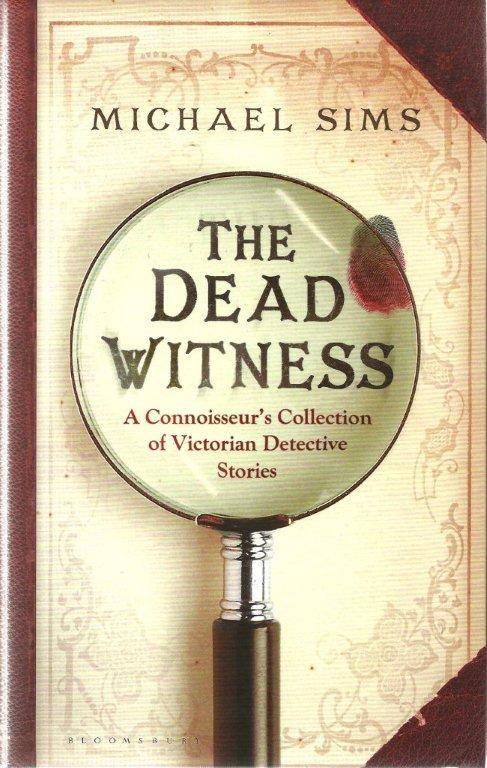
All the big names you might expect are present and correct – Poe, Dickens, Collins, Gaboriau, Conan Doyle, G.K. Chesterton, Melville Davisson Post and Ernest Bramah, along with some unfamiliar ones, presented roughly in chronological order. Among them, I believe is something of a scoop in that the story The Secret Cell by William E. Burton appears in print for the first time since its original publication in 1837. The author’s story is almost more interesting than his fictional one, as Burton was a London-born actor who settled in Philadelphia in 1834 and founded the Gentleman’s Magazine, hiring a certain Edgar Allen Poe as editor. In 1840, Burton sold the magazine which was transformed into Graham’s Magazine and which in 1841 would publish Poe’s own story The Murders in the Rue Morgue. The rest, as they say, is history.
The title of the anthology comes from the story The Dead Witness by Mary Fortune, which first appeared in the Melbourne magazine Australian Journal in 1866 and is thought to be the first detective story written by a woman.
Name Drop
In The Drop, now out from Orion, Michael Connelly has once again proved himself to be the modern master of the ‘police procedural’, pitching his series hero Harry Bosch (now nearing retirement and serving out his time in the Open Unsolved Unit of the LAPD) into a fascinating ‘cold case’ and also a highly political current one.
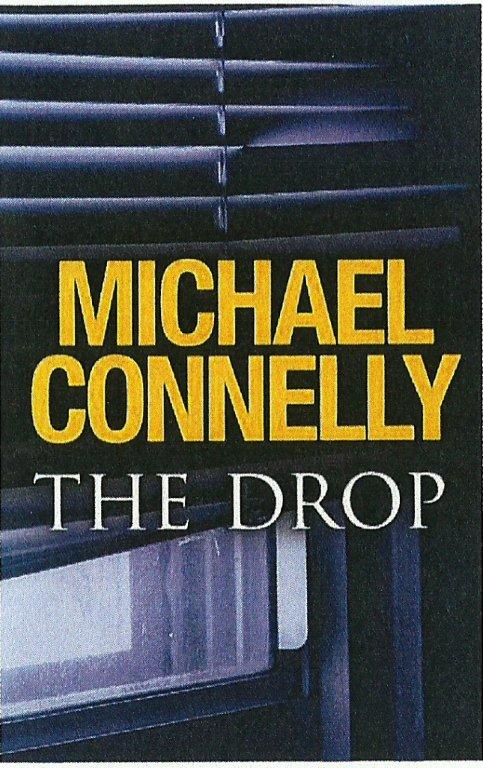
How our upright (though not up-tight) detective hero copes with the “high jingo” of internal police politics is fascinating, but it is when the cold case he is investigating reveals a local serial killer who has been plying his grisly trade for over twenty years, that the book takes off on to another level. Connelly is so good at what he does that – frankly – it’s annoying and he shows his mastery in the climactic scenes where tension and suspense are generated, once the killer has been unmasked, not by a gunfight or a car chase but by the cops agonising over how to conduct a ‘legal’ search to secure the evidence they need.
The Drop is the best Harry Bosch story since....well, probably since the last one.....and one of the best, most satisfying crime novels of the year. It even includes some notable name dropping for those “in the business” – not only referencing and quoting a poem by British crime writer (and poet) John Harvey but by having an LAPD character called ‘Larry Gandle’ who is in real life a noted reviewer and critic of crime fiction in America.
I also learn that although I was not (for legal reasons) present both Michael Connelly and Larry Gandle visited London recently.
Mulling Over Mullholland
For reasons unrecalled‚ but probably legal‚ I did not attend the official launch of Mullholland Books (an imprint of Hodder & Stoughton) earlier this year‚ but feel I really must mention them now that the first tranche of Mulholland titles are elbowing their way on to the shelves of bookshops across the country.

The idea behind the imprint seems to be that it is just that – an imprint – and the hope is that readers will seek out Mullholland-branded books rather than being attracted to a particular cover or author’s name. So ‘Mullholland’ becomes a style of fiction (definitely at the harder edge of the market) which seems to cover crime novel, thriller, spy story and even flirting with horror and the supernatural (with one novel from the scriptwriters of the Saw movies, which I am assured are not Do-It-Yourself instructional films and have nothing to do with Home Improvements).
To give but a small flavour of the Mullholland ‘brand’, their first year’s output includes the suspense thriller Fun and Games by Duane Swierczynski (not only one of the rising names in American crime writing, but also a valuable word score at Scrabble); Thomas Mullen’s The Revisionists which features spies, lawyers and time-travellers; and a first novel, Assassin of Secrets by Q. R. Markham, a retro-fitted spy story set in 1968.
Stout Hearts
My mention of the marvellous Rex Stout in last month’s musings produced the biggest post-bag seen at SHOTS in a long while. Far more than one reader got in touch to prove that Stout and his wonderful detective creation Nero Wolfe are not forgotten, but fondly remembered in places as far away as Australia, Hertford and Hampshire.
A leading member of the Dorothy L. Sayers Society informs me, with ill-contained glee, that her personal library contains 25 Stout/Wolfe titles, three more than mine. Another reader helpfully informs me that many of Wolfe’s adventures can now be borrowed “electronically” (whatever that means) from Hampshire public libraries and Jeremy Cameron (author of the ground-breaking Vinnie Got Blown Away back in 1995) tells me that thanks to the insistence of “an enlightened schoolmaster” he read the entire Stout canon at the time fifty years ago.
In Italy, I am told, Nero Wolfe and side-kick Archie Goodwin featured in a popular television series in the 1960s, which is about to be remade in Rome for broadcast in 2012. In San Marino and Nicaragua, Nero Wolfe has even appeared on postage stamps.
Of course in America there has been, since 1978, a dedicated society aimed at celebrating and promoting the work of Rex Stout. The aptly-named Wolfe Pack (http://www.nerowolfe.org/) also gives an annual Nero Award in December and it will not surprise anyone (except possibly the British crime writing establishment) to learn that short-listed for the 2011 Nero is none other than Canadian diva Louise Penny, who between her physically demanding day jobs as a lumberjill and maple syrup bootlegger, has found time to write Bury Your Dead which has been winning prizes all year long, everywhere except Britain.
Striking Gold
It was a great pleasure to have dinner with that charming American Tom Franklin on the eve of his winning the Crime Writers’ Gold Dagger last month for his novel Crooked Letter, Crooked Letter. The fact that within twenty-four hours of meeting me, Tom Franklin won the most prized award in literary fiction (despite what you might hear elsewhere) has made me realise that I could have a new career as a lucky charm. Thus, I am declaring myself available for hire for pre-awards ceremony dinners to any short-listed authors.
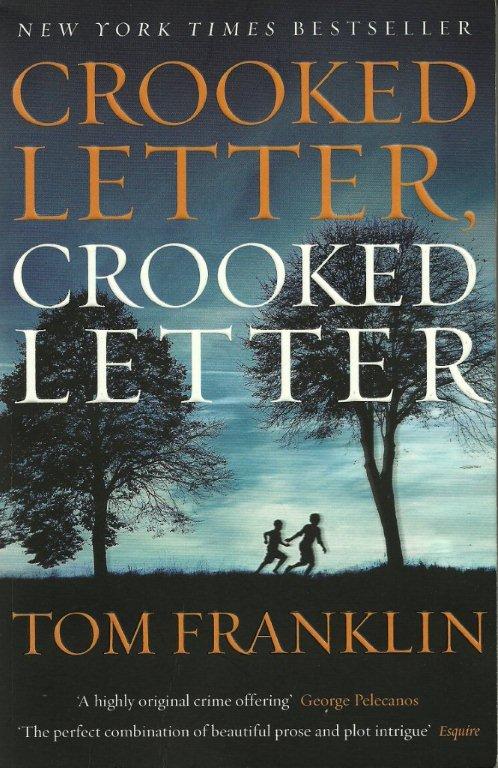 |
 |
Tom Franklin has not only written an engrossing novel of guilt in rural Mississippi (the title refers to the way children are taught to spell the name of the state) which has soft undertones of Twain and Faulkener, but also turns out to be a fund of knowledge on the famous people who live in his adopted state. To begin with, there’s poet Beth Ann Fennelly (his wife) with whom he is jointly writing a novel and which he says is half-finished –‘her half’ that is. Then there are his near neighbours: lawyer-turned-fiction-factory John Grisham and actor Morgan Freeman, not to mention crime writer Ace Atkins.
Now those of us with classically-trained retentive memories who have never struggled to fill all those character spaces on Twitter, will remember Ace Atkins’ Crossroad Blues published here ten or so years ago. It could well become a much more familiar name for, according to Tom, Ace Atkins has been contracted to continue writing the adventures of Boston-based private eye Spenser following the death of Robert B. Parker last year.
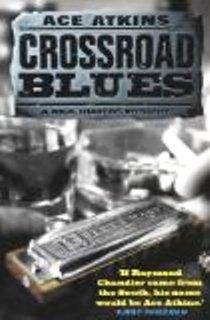
|
|
Oxford Loss
It is with great regret that I note that after 18 years of solid entertainment, Veronica Stallwood’s excellent Kate Ivory series is coming to an end with Oxford Ransom and, tragically, the series will close without a printed book to mark the event.
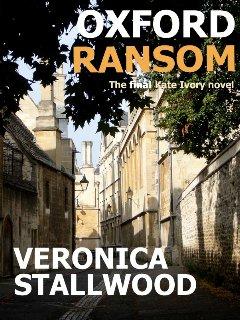
Set in the murder capital of England that is Oxford, often in and around the Bodleian Library, Veronica’s ‘Oxford novels’ featuring amateur sleuth Kate Ivory have delighted and chilled in equal measure over the years, but sadly the series goes out not with a bang but a Kindle. Oxford Ransom, Veronica tells me, is available only as a Kindle download via Amazon.com or Amazon.co.uk and you can even read an extract before purchasing.
For those book-fondling, paper-sniffing, ink-stained die-hards like myself who do not own a ‘Kindle’ she also tells me that a “Free Kindle Reading App” (whatever that is) can be downloaded ‘for PC, MAC, iPad, iPhone and Android’
Although I have had to admit I have no idea who P.C. Mac is, or which force he belongs to (Thames Valley?), or why robots need pads or phones – though they may be for taking notes of course.
However, I am not the first old hack to be baffled by modern technology, nor will I be the last; probably not even the last to feature in this column. And I am not alone in not owning a Kindle e-Reader. Veronica Stallwood hasn’t got one either.
Top Notching
I am not sure whether one can buy a Kindle ‘download’ for someone as a Christmas present, or how one would wrap it, but I do know that books make excellent presents. And for the discerning reader, what better than a finely re-published Great British thriller from the golden age of thriller writing? What better? Why, two absolutely top notch thrillers!
Which brings me, coincidentally, to the latest releases by the Top Notch Thriller imprint of Ostara Publishing which celebrate two very special fictional agents.
In what is in fact the year of his Diamond Jubilee, the fictional hero who can claim to have been Britain’s first ‘licensed to kill’ special agent, Johnny Fedora, is featured in one of his most famous adventures Undertow by Desmond Cory (the pen-name of the late Shaun Lloyd McCarthy). First published in 1962, Undertow, set in Franco’s Spain on the Costa del Sol before it got landscaped by holiday-makers, is the first encounter between Fedora – a half-Irish, half-Spanish assassin contracted to the British Foreign Office – and Feramontov, the KGB chief who was be Fedora’s arch enemy in four subsequent novels which became known as the ‘Feramontov Quintet’.
Fedora, however, made his first appearance in print sixty years ago in 1951, two years before a certain James Bond and indeed became known as ‘the thinking man’s James Bond’, not the least by the noted American critic Anthony Boucher. Fedora was certainly Desmond Cory’s most famous character, but he was a prolific writer in several fields and famed for thrillers such as Deadfall (filmed with Michael Caine) and The Circe Complex which became a successful television series. He also did a nice line in quirky detective novels, and I especially remember The Strange Attractor which I reviewed for the Daily Telegraph about twenty years ago.
David Brierley’s 1979 debut novel Cold War introduced a new tough, resourceful and female agent in the shape of 28-year-old Cody, a disillusioned, former CIA operative trying (and failing) to stay under the radar in Paris whilst the Cold War – possibly literally – comes to France with a vengeance. With no allies or back-up, Cody is thrown into the middle of an international conspiracy which begins with several attempts on her life during a French election campaign, proving the maxim that if you want somebody killed in France, during an election is the best time to do it.
Cody (she has no other name) may well have been the first feminine agent on the thriller scene since Modesty Blaise back in 1965 and whilst Modesty Blaise was inevitably referred to as ‘the female James Bond’, a more relevant comparison for Cody if comparison were needed was that she was more like a female Quiller than a Bond. There is a tight, taut resourcefulness about Cody, who keeps all her senses on red alert even when naked and unarmed in an East German prison or taking on a Doberman in hand-to-jaw combat. Coincidentally, David Brierley, who lives in France, tells me that he knew the creator of super-agent Quiller, the late ‘Adam Hall’ (Elleston Trevor), and was a guest at Hall’s home in his adopted Arizona.
Cody went on to feature in five novels in total, though not quite in her original form. When Cold War first appeared to glowing reviews, the American publishers who bought the rights suggested that Cody should be clearly British (and presumably ex-MI6) rather than an American CIA drop-out. The TNT edition is, however, the one, the only, the original Cody.
Full details of Undertow and Cold War can be found on the Ostara website at www.ostarapublishing.co.uk where there is also an appreciation of the work of Desmond Cory by his sons John and Richard McCarthy.
Missing Maestro
I have been trawling through my crime fiction reference books recently (including a well-known ‘encyclopedia’) but I have failed to find any mention among the great and good of C. S. Forester, whom I have come to regard as a cruelly-overlooked figure of some importance in British crime writing. In fact I had to rely (as I usually do) on Harry Keating’s splendid 1982 guide to the genre, Whodunit?, to find any reference to him at all.
Although far better known for the Hornblower series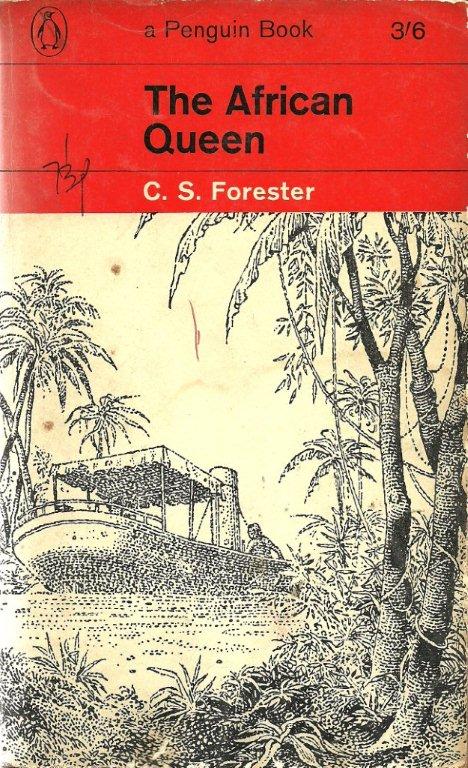 and his many other seafaring war stories, as well as The African Queen and the superb World War I thriller Brown on Resolution, C.S. Forester (1899-1966) deserves to be far better known as a crime writer and as one of the innovators of what is known as ‘the inverted detective story’ – in other words, one which starts off by telling you ‘whodunit’ in Chapter One, sometimes on Line One. The ‘inverted puzzle’ technique (perfected on television in Columbo) is sometimes attributed to R. Austin Freeman in short stories written as early as 1912 though perhaps the most famous example is Francis Iles’ Malice Aforethought from 1931. Whoever invented the ‘inverted’ (and Austin Freeman claimed he did), it was an important catalyst for it marked the shift from the simple ‘fair play’ detective story into what we would now call the crime novel; and that revolution, favouring character and psychology over pure mechanical plot, happened right in the middle of what is now called the ‘Golden Age’ of the English detective story and Forester was right at the heart of it. and his many other seafaring war stories, as well as The African Queen and the superb World War I thriller Brown on Resolution, C.S. Forester (1899-1966) deserves to be far better known as a crime writer and as one of the innovators of what is known as ‘the inverted detective story’ – in other words, one which starts off by telling you ‘whodunit’ in Chapter One, sometimes on Line One. The ‘inverted puzzle’ technique (perfected on television in Columbo) is sometimes attributed to R. Austin Freeman in short stories written as early as 1912 though perhaps the most famous example is Francis Iles’ Malice Aforethought from 1931. Whoever invented the ‘inverted’ (and Austin Freeman claimed he did), it was an important catalyst for it marked the shift from the simple ‘fair play’ detective story into what we would now call the crime novel; and that revolution, favouring character and psychology over pure mechanical plot, happened right in the middle of what is now called the ‘Golden Age’ of the English detective story and Forester was right at the heart of it.
In 1926‚ five years before Francis Iles‚ and at the ridiculously young age of about 25 he wrote Payment Deferred (which as I have only just discovered was filmed in 1931 starring Charles Laughton) and followed that in 1930 with Plain Murder. Both these novels are important (not to mention extremely readable 80+ years on) to the development of the British crime novel not just because the murderer and victim are presented openly from the start but also because there are no ‘genius’ amateur detectives involved or indeed any policemen. Even more interesting Forester does not set his crimes among the aristocracy and there isn’t a country house anywhere in sight. Forester’s crime scenes are distinctly lower middle class and suburban and I haven’t come across any other writer who conjures up jealousy‚ greed‚ sexual frustration and domestic violence as well as he does among the dusty smoke-stained chimney pots and behind the heavy curtains of a west London avenue or crescent.
For many a year I have been advocating Forester’s two crime novels as required reading for any serious student of the genre but now I discover that even I have been selling him short for there was a third crime novel which he wrote in 1935 but has only been published this month.
The Pursued‚ which is published for the first time as a Penguin Classic (who have also reissued Payment Deferred and Plain Murder) is a Forester novel which somehow got ‘lost’ between The African Queen and the take-off of his Hornblower series. It has been a long wait but well worth it. Once again Forester peeps behind the net curtains to glimpse the thinly repressed sexual frustrations and domestic sadism lurking in a seemingly respectable suburban street. Yet this time it is not a murderer revealed on Page One‚ rather the suicide of a young (pregnant) women baby-sitting for her sister. The murder comes later as the sister and her mother decide to take the law – and the resulting consequences - into their own hands.
The Pursued is a remarkable piece of noir fiction given the period when it was written (and the fact that it was British and suburban rather than American) as you know from the start that this is not going to end happily for any of the characters. Given the time it was written‚ the contemporary stars of British crime writing – Christie Sayers and Allingham – were at the height of their imaginative powers and perhaps this determinedly downbeat‚ clinically unsentimental chiller was thought to be somehow out of place. In fact it had much more in common with the noir fiction of Americans Horace McCoy and James M. Cain; and that’s mighty fine company to be in.
Knight Errants
As the Autumn evenings draw in I have made it something of a personal tradition to settle down in front of a log fire with a new book by my old chum Professor Bernard Knight. In recent years these have gravitated away from the medieval mysteries for which he is famous to the exploits of a young forensic pathologist plying his trade in the Welsh borderlands in the 1950s. personal tradition to settle down in front of a log fire with a new book by my old chum Professor Bernard Knight. In recent years these have gravitated away from the medieval mysteries for which he is famous to the exploits of a young forensic pathologist plying his trade in the Welsh borderlands in the 1950s.
His latest Grounds for Appeal‚ from those select publishers Severn House‚ is the fourth of Knight’s charming thrillers to feature Dr Richard Pryor whose career may possibly – just perhaps – mirror that of the well-known‚ now retired Home Office pathologist Bernard Knight....
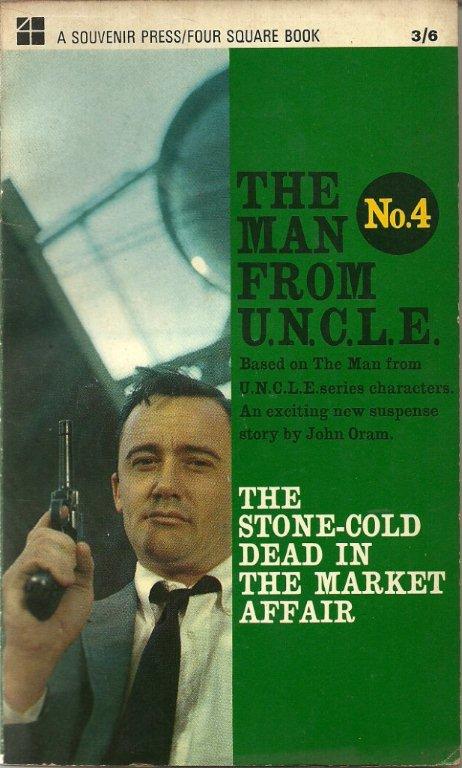 For me though the appeal of this particular book is the insight it gives into the hotbed of crime and criminal behaviour that is Wales and it may come as a surprise to readers who have led sheltered lives in England that Wales is such a nest of conspiracy and intrigue. It will not of course surprise or shock readers of Jasper Fforde or Malcolm Pryce‚ nor of John Oram. For me though the appeal of this particular book is the insight it gives into the hotbed of crime and criminal behaviour that is Wales and it may come as a surprise to readers who have led sheltered lives in England that Wales is such a nest of conspiracy and intrigue. It will not of course surprise or shock readers of Jasper Fforde or Malcolm Pryce‚ nor of John Oram.
John Oram‚ in case you had forgotten was the author‚ in 1966‚ of The Man from U.N.C.L.E. Book 4 entitled The Stone-Cold Dead in the Market Affair; and I had quite forgotten that the Market in the title actually referred to Market Street in Newport in Monmouthshire. If it takes sending Napoleon Solo and Ilya Kuryakin to Newport to foil a plan to take-over the world then perhaps we should take the Welsh more seriously.
To Infinity and Beyond....
...or at least 2012.
From the large number of advanced proofs falling like dead crows through the letter box here at Ripster Hall (just who is it who is sending me the dead crows???), my reading schedule for next year is already being mapped out by the sinister supernatural forces which control British publishing.
Some books I am already aware of and indeed looking forward to for the others I will have to trust to the publishers’ recommendations (and I can’t believe I just wrote ‘trust’ and ‘publishers’ in the same breath).
I know that I have to wait for a few months more to see the new spy novel from the supremely talented (and ridiculously tall and handsome) Charles Cumming A Foreign Country, which is published by HarperCollins in, I think, April. I will then have to wait another month to get my hands on the new novel by Elizabeth Wilson The Girl in Berlin from Serpent’s Tail and if it is half as good as her War Damage then it will have been worth it.
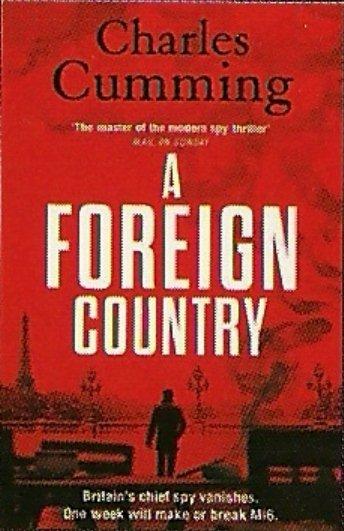  |
|
Among those titles by authors whose work I do not know, I will certainly be looking out for the debut thriller of Claire McGowan in February from Headline titled The Fall, as this was recommended to me personally by Claire’s editor some months ago. Before then, in January, I will be on the trail of a couple of prize-winning authors, both of whom have won the highest and most glittering prizes recently. Belinda Bauer won a Gold Dagger for her debut crime novel and 2012 will see her third, Finders Keepers, published by Bantam and as she is, according to The Sunday Times: “The writer most likely to lead the fight back against the Scandinavian crime-wave”, I am sure I will enjoy it as I need all the allies I can find. Simultaneously, Orion publish the new novel from this year’s Steel Dagger winning author Steve Hamilton, entitled Misery Bay, which I have already sneaked a peak at and am already hooked.
Also in January, I will be looking out for a debut thriller set in Manchester, The Doll Princess by Tom Benn published by Jonathan Cape. I know very little about Manchester, although I believe the city now has a decent football team, but I do remember enjoying Nicholas Blincoe’s wonderful Manchester Slingback back in 1998 (both the actual book and the infamous launch party in the Freedom Club in London’s Soho, of which I still hold the negatives). Curiously my proof copy of The Doll Princess has an illustration of what one might (hopefully without charges of sexism) call a ‘leggy’ young lady, just as, albeit a tad more flamboyantly did Manchester Slingback.

I have always wondered what became of the young lady who posed for that cover, for clearly she had talent....
Open House
It is traditional‚ at this time of year‚ for me to throw open the gates of Ripster Hall and invite in the local villagers for two events which are becoming firm fixtures on the social calendar, the first being my annual Creative Crime Writing seminar which, for the lucky few who passed the entrance exam‚ was held in one of the many Snug bars at the Hall.
Then the servants’ dining room became the venue for the annual cull of the Ripster Hall library and the sale of volumes surplus to requirements to an enthusiastic crowd, many of whom had queued overnight to spend their hard-earned savings in aid of my adopted charity, the National Society for the Promotion of Cruelty to Children which was established many years ago by my old chum and fellow boulevardier William Claude Dukenfield.
 
However, the crowds thronging Ripster Hall were as nothing to those which stormed a well-known bookshop in a frenzy to get hold of copies of that excellent historical thriller To Kill A Tsar by my good friend Andrew Williams when it was published in paperback recently.
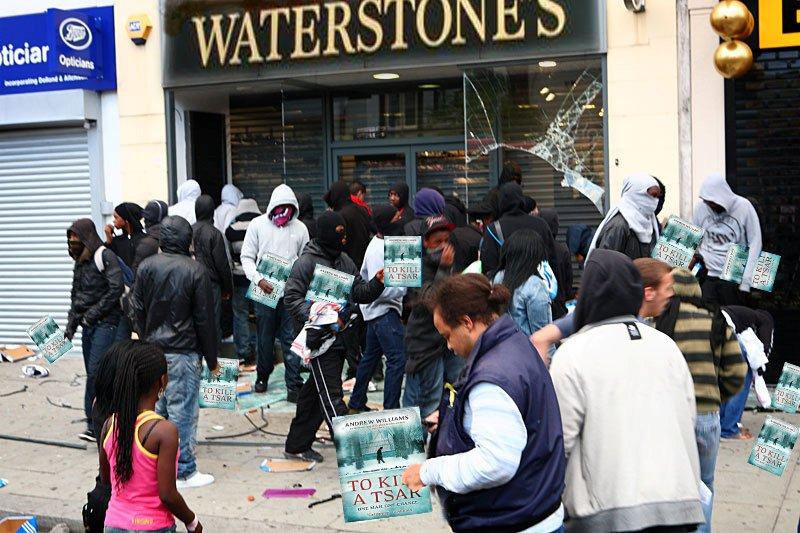
Toodles!
The Ripster
|